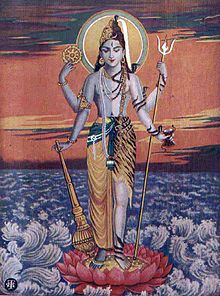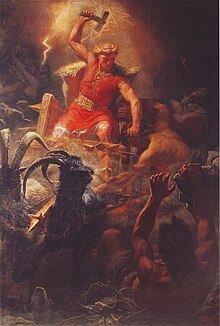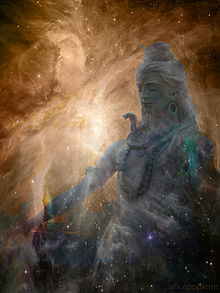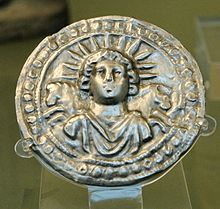Mythology
Appearance


Mythology can refer either to a set of myths (a mythos), especially those belonging to particular sacred, religious or cultural traditions of groups of people, or to the study of such myths, as stories told to explain or indicate aspects of nature, history, and customs.
- Legend redirects here — for the 1986 fantasy film of that name, see Legend (film)
- Alphabetized by author or source
- A · B · C · D · E · F · G · H · I · J · K · L · M · N · O · P · Q · R · S · T · U · V · W · X · Y · Z · See also · External links
A
[edit]- Myth may be seen as a teleological statement, a shaped system of reference that allows us to order and thus comprehend perception and knowledge, as Mann suggests. The existence of mythic structures supposes a rational ordering of the universe. The presence of myth in a culture signifies a belief in the teleological nature of existence and indicates that powers other than those of material existence, or what Carlos Castaneda calls “ordinary reality,” guide and direct the universe and human participation in it. As such myth stands as an expression of human need for coherence and integration and as the mode whereby human beings might actively fill that need.
- Paula Gunn Allen, The Sacred Hoop: Recovering the Feminine in American Indian Traditions. Beacon Press. 1 September 1992. ISBN 978-0-8070-4617-3. Chapter Two
- Myth is more than a statement about how the world ought to work; its poetic and mystic dimensions indicate that it embodies a sense of reality that includes all human capacities, ideal or actual. These, broadly speaking, are the tendency to feel or emotively relate to experience and the tendency to intellectually organize it—the religious, aesthetic, and philosophical aspects of human cultures. Human beings need to belong to a tradition and equally need to know about the world in which they find themselves. Myth is a kind of story that allows a holistic image to pervade and shape consciousness, thus providing a coherent and empowering matrix for action and relationship. It is in this sense that myth is most significant, for it is this creative, ordering capacity of myth that frightens and attracts the rationalistic, other-centered mind, forcing it into thinly veiled pejoration of the mythic faculty, alienistic analysis of it, and counter myth-making of its own. Myth, then, is an expression of the tendency to make stories of power out of the life we live in imagination; from this faculty when it is engaged in ordinary states of consciousness come tales and stories. When it is engaged in nonordinary states, myth proper—that is, mystery mumblings—occur.
- Paula Gunn Allen, The Sacred Hoop: Recovering the Feminine in American Indian Traditions. Beacon Press. 1 September 1992. ISBN 978-0-8070-4617-3. Chapter Two
- Myth is a story of a vision; it is a presentation of that vision told in terms of the vision’s symbols, characters, chronology, and import. It is a vehicle of transmission, of sharing, of renewal, and as such plays an integral part in the ongoing psychic life of a people.
- Paula Gunn Allen, about visions among the Indigenous peoples of the Americas, The Sacred Hoop: Recovering the Feminine in American Indian Traditions. Beacon Press. 1 September 1992. ISBN 978-0-8070-4617-3. Chapter Two
- In Love and Will, Rollo May recounts an experience he had with a Cézanne painting, contending that the painting was “mythic” because it encompassed “near and far, past, present and future, conscious and unconscious in one immediate totality of our relationship to the world.” In this way, myth acts as a lens through which we can discover the reality that exists beyond the limits of simple linear perception; it is an image, a verbal construct, that allows truth to emerge into direct consciousness. In this way, myth allows us to rediscover ourselves in our most human and ennobling dimensions. Through it we are allowed to see our own transcendent powers triumphant; we know, experientially, our true identity and our human capacity that is beyond behaviorism, history, and the machine.
- Paula Gunn Allen, about visions among the Indigenous peoples of the Americas, The Sacred Hoop: Recovering the Feminine in American Indian Traditions. Beacon Press. 1 September 1992. ISBN 978-0-8070-4617-3. Chapter Two
- Myth functions as an affirmation of self that transcends the temporal. It guides our attention toward a view of ourselves, a possibility, that we might not otherwise encounter. It shows us our own ability to accept and allow the eternal to be part of our selves. It allows us to image a marriage between our conscious and unconscious, fusing the twin dimensions of mind and society into a coherent, meaningful whole. It allows us to adventure in distant, unfamiliar landscapes while remaining close to home. Thus myth shows us that it is possible to relate ourselves to the grand and mysterious universe that surrounds and informs our being; it makes us aware of other orders of reality and experience and in that awareness makes the universe our home. It is a magic: it is the area of relationship between all those parts of experience that commonly divide us from ourselves, our universe, and our fellows.
- Paula Gunn Allen, about visions among the Indigenous peoples of the Americas, The Sacred Hoop: Recovering the Feminine in American Indian Traditions. Beacon Press. 1 September 1992. ISBN 978-0-8070-4617-3. Chapter Two
- In the myth, and especially the mythopoeic vision that gives it birth, past, present, and future are one, and the human counterparts of these—ancestors, contemporaries, and descendents—are also one. Conscious and unconscious are united through the magic of symbolic progression so that the symbols can convey direct, rational meanings and stir indirect memories and insights that have not been raised to conscious articulation. In mythopoeic vision and its literary counterparts, the near and the far must come together, for in its grasp we stand in a transcendent landscape that incorporates both. Lastly, the mythic heals, it makes us whole. For in relating our separate experiences to one another, in weaving them into coherence and therefore significance, a sense of wholeness arises, a totality which, by virtue of our active participation, constitutes direct and immediate comprehension of ourselves and the universe of which we are integral parts.
- Paula Gunn Allen, about visions among the Indigenous peoples of the Americas, The Sacred Hoop: Recovering the Feminine in American Indian Traditions. Beacon Press. 1 September 1992. ISBN 978-0-8070-4617-3. Chapter Two
B
[edit]- In myth and legend the rainbow has been regarded variously as a harbinger of misfortune and as a sign of good luck.
- Carl Benjamin Boyer, in The Rainbow: From Myth to Mathematics (1959), p. 27
C
[edit]D
[edit]

- Scientific beliefs are supported by evidence, and they get results. Myths and faiths are not and do not.
- Richard Dawkins, River out of Eden (1995)
- Myths are fun, as long as you don't confuse them with the truth.
- Richard Dawkins, The Magic Of Reality (2012)
E
[edit]
- Myths describe the various and sometimes dramatic breakthroughs of the sacred (or the "supernatural") into the World. It is this sudden breakthrough of the sacred that really establishes the World and makes it what it is today. Furthermore, it is as a result of the intervention of Supernatural Beings that man himself is what he is today, a mortal, sexed, and cultural being...
- Mircea Eliade, Myth and Reality (1963), as translated by Willard R. Trask
- Whereas "false stories" can be told anywhere and at any time, myths must not be recited except during a period of sacred time (usually in autumn or winter, and only at night).... This custom has survived even among peoples who have passed beyond the archaic stage of culture.
- Mircea Eliade, Myth and Reality (1963), as translated by Willard R. Trask
F
[edit]
- The disinterested imaginative core of mythology is what develops into literature, science, philosophy. Religion is applied mythology.
- Northrop Frye, Notebooks (1912–1991), 21.101
- A purely individualized myth is an obsession, sometimes a psychosis. A purely socialized myth is an ideology, which sooner or later also becomes obsessive or psychotic. A myth that has either the direct current of transcendence or the alternating current of imagination rises clear of this grisly antithesis.
- Northrop Frye, Late Notebooks, 1982–1990: Architecture of the Spiritual World (2002), vol. 2, p. 716
G
[edit]- I don’t like the word "allegorical", I don’t like the word "symbolic", the word I really like is "mythic" and people always think that means "full of lies" when what it really means is full of a truth that cannot be told in any other way but a story.
- William Golding, interview in regard to his work Rites of Passage, quoted in The Dreams of William Golden, BBC Arena (2012)
H
[edit]- Real myths are often strange and startlingly unfamiliar, and don't always give up their meanings easily; you have to tease them out, and for me, that's one of the pleasures of reading older collections of lore.
- Elizabeth Hand, Elizabeth Hand on Mortal Love at HarperCollins (2004)
I
[edit]J
[edit]- It is necessary to recognize that with respect to unity and coherence, mythical explanation carries one much further than scientific explanation. For science does not, as its primary objective, seek a complete and definitive explanation of the Universe... It satisfies itself with partial and conditional responses. Whether they be magical, mythical, or religious, the other systems of explanation include everything. They are applied to all domains. They answer all questions. They account for the origin, for the present and even for the evolution of the universe.
- François Jacob, as quoted by John D. Barrow, New Theories of Everything (2007)
K
[edit]
- A major component of the western myth is the belief that myth is a primitive and mistaken way of thinking about the world that has been replaced by science. Commonly, the word “myth” is now used to mean an illusion or a lie... Enlightened moderns are accustomed to looking at the queer beliefs of the Mayas or the Tassaday and seeing them as mythical. But we look on our own belief systems as rational and rooted in the realities of politics and economics. As Joseph Campbell says: “Myth is other people’s religion.”
- Sam Keen, The Passionate Life (1983), p. 20
- Myth is the system of basic metaphors, images, and stories that in-forms the perceptions, memories, and aspirations of a people; provides the rationale for its institutions, rituals and power structure; and gives a map of the purpose and stages of life.
- Sam Keen, The Passionate Life (1983), p. 21
- A living myth remains largely unconscious for the majority. It is the reality, not the symbol. … Some people in every culture, however, see through or beyond the myth. … Those whose amphibious minds move both within and beyond the myth may be thought of as outlaws or metaphysicians. Myth and metaphysics are related to each other in the same way that religion is related to theology. The mythical mind is unreflective. It lives unquestioningly within a horizon of the culture’s images, stories, rituals, and symbols, just as the religious person rests content within the liturgy and creedal structure of the church or cult. The metaphysical mind reflects upon the myth and tries to make it conscious. It plays with the stories and images and lifts the basic presuppositions about life into the light of consciousness. In this sense, metaphysics is the thinking person’s religion.
- Sam Keen, The Passionate Life (1983), p. 21
L
[edit]M
[edit]- Theology is to-day recognised to be the instrument of myth, philosophy to be the instrument of science.
- Garrigue Masaryk, Thomas (1919), The Spirit of Russia, I, p. 208
- Hollywood industrialized mythology, and then weaponized it.
- Mike Myers, in the first chapter of his memoir Canada (2016)
N
[edit]- Without myth, however, every culture loses its healthy creative natural power: it is only a horizon encompassed with myth that rounds off to unity a social movement.
- Friedrich Nietzsche, The Birth of Tragedy (1872)
- These philosophers show which dangers Greek culture harbored within itself:
Myth as the lazybed of thought—against this, cold abstraction and strict science. Democritus.- Friedrich Nietzsche, "The Struggle between Knowledge and Wisdom" (1875)
O
[edit]P
[edit]- Myths and endless genealogies ... promote controversial speculations rather than advancing God’s work—which is by faith.
- Paul of Tarsus, 1 Timothy 1:3-4 NIV
- Are there any mythical beasts which aren't simple pastiches of nature? Centaurs, minotaurs, unicorns, griffons, chimeras, sphinxes, manticores, and the like don't speak well for the human imagination. None is as novel as a kangaroo or starfish.
- William Poundstone, Labyrinths of Reason (1988), p. 11
Q
[edit]R
[edit]- If a man is offered a fact which goes against his instincts, he will scrutinize it closely, and unless the evidence is overwhelming, he will refuse to believe it. If, on the other hand, he is offered something which affords a reason for acting in accordance with his instincts, he will accept it even on the slenderest evidence. The origin of myths is explained in this way.
- Bertrand Russell, Proposed Roads To Freedom (1918), Ch. VI: International relations, p. 97
- There is something feeble and a little contemptible about a man who cannot face the perils of life without the help of comfortable myths.
- Bertrand Russell, Human Society in Ethics and Politics (1954), p. 219
S
[edit]
- That the myths are divine can be seen from those who have used them. Myths have been used by inspired poets, by the best of philosophers, by those who established the mysteries, and by the Gods themselves in oracles. But why the myths are divine it is the duty of philosophy to inquire. Since all existing things rejoice in that which is like them and reject that which is unlike, the stories about the Gods ought to be like the Gods, so that they may both be worthy of the divine essence and make the Gods well disposed to those who speak of them: which could only be done by means of myths.
- Sallustius, On the Gods and the Cosmos (4th c.), III. Concerning myths; that they are divine, and why
- Myths are not the stuff of which sensible policy is made.
- Irwin Stelzer, "Letter from Londonistan" (1 August 2005), The Weekly Standard
- Mental illness is a myth. Psychiatrists are not concerned with mental illnesses and their treatments. In actual practice they deal with personal, social and ethical problems in living.
T
[edit]
- Anonymous myths give birth to other anonymous myths, multiplying and ramifying themselves without the fear of one being absorbed by the other, and beyond any myth teller’s control. Like leaves of grass, they grow and die following the rhythm of impermanent-permanent nature.
- Trinh T. Minh-ha, Woman, Native, Other: Writing Postcoloniality and Feminism. Indiana University Press. 1989. p. 61. ISBN 978-0-253-36603-0.
- Myths circulate like gifts without givers, and no myth teller (cares to) knows where they come from or who invented them.
- Trinh T. Minh-ha, Woman, Native, Other: Writing Postcoloniality and Feminism. Indiana University Press. 1989. p. 61. ISBN 978-0-253-36603-0.
- To some extent, mythology is only the most ancient history and biography. So far from being false or fabulous in the common sense, it contains only enduring and essential truth, the I and you, the here and there, the now and then, being omitted. Either time or rare wisdom writes it. Before printing was discovered, a century was equal to a thousand years. The poet is he who can write some pure mythology to-day without the aid of posterity.
- Henry David Thoreau, A Week on the Concord and Marrimack Rivers (1849)
- Mythology is the crop which the Old World bore before its soil was exhausted.
- Henry David Thoreau, Walking (1862)
- The significance of a myth is not easily to be pinned on paper by analytical reasoning. It is at its best when it is presented by a poet who feels rather than makes explicit what his theme portends; who presents it incarnate in the world of history and geography, as our poet has done. Its defender is thus at a disadvantage: unless he is careful, and speaks in parables, he will kill what he is studying by vivisection, and he will be left with a formal or mechanical allegory, and what is more, probably with one that will not work. For myth is alive at once and in all its parts, and dies before it can be dissected.
- J. R. R. Tolkien, "Beowulf: The Monsters and the Critics" (1936), p. 14
- I think if she comes from anywhere that has a name, it is out of myth. And myth has been my study and joy ever since — oh, the age, I would think . . . of three. I’ve studied it all my life. No culture can satisfactorily move along its forward course without its myths, which are its teachings, its fundamental dealing with the truth of things, and the one reality that underlies everything.
- P. L. Travers, on her creation of "Mary Poppins", as quoted in "P. L. Travers, The Art of Fiction No. 63" an interview by Edwina Burness and Jerry Griswold, in The Paris Review No. 86 (Winter 1982)
- Friend Monkey is really my favorite of all my books because the Hindu myth on which it is based is my favorite — the myth of the Monkey Lord who loved so much that he created chaos wherever he went. … when you read the Ramayana you’ll come across the story of Hanuman on which I built my version of that very old myth.
I love Friend Monkey. I love the story of Hanuman. For many years, it remained in my very blood because he’s someone who loves too much and can’t help it. I don’t know where I first heard of him, but the story remained with me and I knew it would come out of me somehow or other. But I didn’t know what shape it would take.- P. L. Travers, as quoted in "P. L. Travers, The Art of Fiction No. 63" an interview by Edwina Burness and Jerry Griswold, in The Paris Review No. 86 (Winter 1982)
- More and more I’ve become convinced that the great treasure to possess is the unknown. I’m going to write, I hope, a lot about that. It’s with my unknowing that I come to the myths. If I came to them knowing, I would have nothing to learn. But I bring my unknowing, which is a tangible thing, a clear space, something that’s been made room for out of the muddle of ordinary psychic stuff, an empty space.
- P. L. Travers, as quoted in "P. L. Travers, The Art of Fiction No. 63" an interview by Edwina Burness and Jerry Griswold, in The Paris Review No. 86 (Winter 1982)
- The true fairytales … come straight out of myth; they are, as it were, minuscule reaffirmation of myths, or perhaps the myth made accessible to the local folky mind. One might say that fairytales are the myths falling into time and locality … is the same stuff, all the essentials are there, it is small, but perfect. Not minimized, not to be made digestible for children.
- P. L. Travers, as quoted in Myth, Symbol, and Meaning in Mary Poppins: The Governess as Provocateur (2007) by Giorgia Grilli, Ch. 2, p. 39
U
[edit]V
[edit]W
[edit]
- An entire mythology is stored within our language.
- Ludwig Wittgenstein Philosophical Occasions 1912-1951 (1993) Ch. 7 : Remarks on Frazer's Golden Bough, p. 133
X
[edit]Y
[edit]Z
[edit]- The mythology is kind of a pattern. I'm very taken by mythology. I read it at a very early age and kept on reading it. Before I discovered science fiction I was reading mythology. And from that I got interested in comparative religion and folklore and related subjects. And when I began writing, it was just a fertile area I could use in my stories...
- Roger Zelazny "A Conversation With Roger Zelazny" (8 April 1978), talking with Terry Dowling and Keith Curtis in Science Fiction Vol. 1, #2 (June 1978)
See also
[edit]- Christ myth theory
- Christian mythology
- Demythologization
- Greek myths
- Mythologies of the Indigenous peoples of the Americas
External links
[edit]- The New Student's Reference Work — Mythology (1914)
- "The History of Mythology: Part I" by Scott Leonard
- Greek mythology
- Sacred texts
- Myths and Myth-Makers — Old Tales and Superstitions Interpreted by John Fiske
- Lexicon Iconographicum Mythologize Classicae (LIMC), a database of ancient objects linked with mythology
- Joseph Campbell on Bill Moyers's The Power of Myth
- Dreams, Visions, and Myths: Making Sense of Our World
